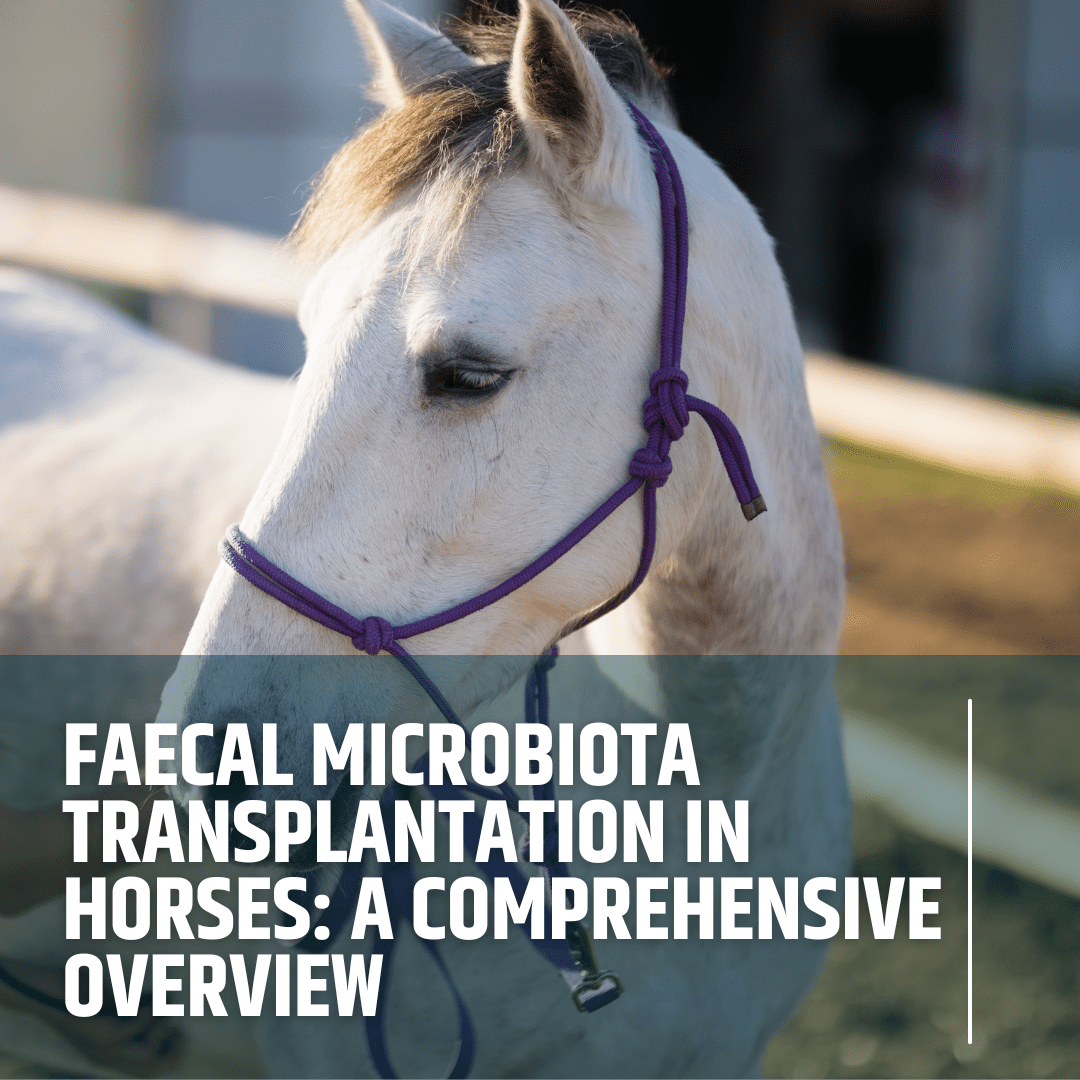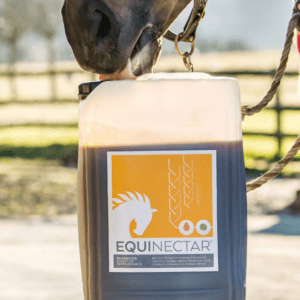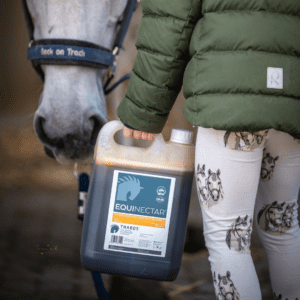01
Introduction
Faecal microbiota transplantation (FMT) has emerged as a novel therapeutic approach in equine medicine, offering promising results for various gastrointestinal disorders in horses. This article aims to provide a comprehensive overview of FMT in equine practice, its potential benefits, and current research findings.
02
Understanding the Equine Microbiome
The equine gastrointestinal tract harbours a complex and diverse microbial ecosystem, collectively known as the microbiome (2). This intricate community of microorganisms plays a crucial role in maintaining the horse's overall health, particularly in aspects of digestion, nutrient absorption, and immune function (3). The delicate balance of the equine microbiome can be disrupted by various factors, including diet changes, stress, and antibiotic use, potentially leading to gastrointestinal disorders (3).
03
The Concept of Faecal Microbiota Transplantation
Faecal microbiota transplantation involves the transfer of faecal material from a healthy donor horse to a recipient horse with the aim of restoring a healthy gut microbial community (1). This procedure has gained traction in recent years as a potential treatment for various equine gastrointestinal conditions, including acute and chronic diarrhoea, colitis, and certain forms of colic (1).
04
The FMT Procedure in Horses
According to a systematic review by Tuniazi et al in 2023, the process of FMT in horses typically involves several steps (1):
1. Donor Selection
A healthy horse with no history of gastrointestinal disorders is chosen as the donor.
2. Faecal sample collection
Fresh faecal material is collected from the donor horse under strict hygienic conditions.
3. Sample preparation
The collected faecal material is processed and mixed with a saline solution to create a liquid suspension.
4. Administration
The prepared faecal suspension is administered to the recipient horse, usually via nasogastric intubation or, in some cases, as an enema.
05
Potential Applications of FMT in Equine Medicine
Research into FMT for horses has shown promising results in several areas (1 & 4):
1. Treatment of Clostridioides difficile infections
FMT has demonstrated efficacy in treating recurrent C. difficile infections in horses, which can cause severe diarrhoea and colitis.
2. Management of chronic diarrhoea
Horses suffering from chronic diarrhoea of unknown origin have shown improvement following FMT procedures. A research conducted in 2023, found that FMT appears to be effective in treating certain gastrointestinal disorders in horses, including colitis and diarrhoea, with reported success rates ranging from 75% to 91.3% (1).
3. Post-antibiotic gut restoration
FMT may help in restoring gut microbial balance in horses that have undergone prolonged antibiotic treatment.
4. Potential for metabolic conditions
Ongoing research is exploring the potential of FMT in managing equine metabolic syndrome and laminitis.
06
Current Research and Future Directions
While FMT shows promise, it is still considered an experimental treatment in equine medicine. Ongoing research aims to (1 & 5):
1. Standardise protocols for donor selection and screening.
2. Optimise faecal material preparation and administration techniques.
3. Investigate the long-term effects and safety of FMT in horses.
4. Explore the potential of using frozen or lyophilised faecal material for more convenient storage and administration.
07
Challenges and Considerations
Despite its potential, FMT in horses faces several challenges:
1. Regulatory concerns
The use of FMT in veterinary medicine is not yet widely regulated, raising questions about standardisation and safety (2)
2. Donor screening
Ensuring the absence of pathogens in donor faeces is crucial to prevent disease transmission (1)
3. Long-term efficacy
More research is needed to determine the long-term effects and durability of FMT in horses.
4. Recipient preparation (fresh and frozen transplant material for treatment)
Determining the optimal pre-treatment protocols for recipient horses to enhance FMT success rates. While some studies offer promise, evidence to demonstrate the viability of faecal microbiota in the stored FMT product has largely been unexplored in human subjects and has never been tested to date in equines (5)
08
Complementary Approaches to Gut Health
While FMT represents an innovative approach to managing equine gastrointestinal health, it is essential to consider complementary strategies that support overall gut function. One such approach involves the use of specialised digestive supplements designed to enhance equine digestion and promote a healthy gut environment.
09
The Role of EquiNectar®
In this context, it is worth mentioning EquiNectar®, a digestive syrup that can be added to a horse's feed. EquiNectar® is formulated from malted barley, which preserves the natural goodness of the barley grain. This unique product provides active digestive enzymes that support equine digestion, including amylase, fructanase, phytase, cellulase, xylanase, and beta-glucanase. These enzymes play crucial roles in breaking down various components of the horse's diet, such as starches, complex sugars, and plant cell walls. Additionally, EquiNectar® contains all B vitamins, with notably high levels of folate and niacin. Its palatable nature encourages even the fussiest horses to finish their feed, making it a valuable addition to equine nutrition regimens. By optimising hindgut bacteria and potentially reducing gas production and bloating, EquiNectar® may contribute to improved digestive health, which could complement the benefits of treatments like FMT.
10
Conclusion
Faecal microbiota transplantation represents a promising frontier in equine gastroenterology (1). As research progresses, this innovative approach may offer new hope for horses suffering from various gastrointestinal disorders. However, it is crucial to approach FMT with caution and continue rigorous scientific investigation to fully understand its potential benefits and risks in equine medicine (4).
The integration of FMT with other gut health strategies, such as the use of digestive supplements like EquiNectar®, may offer a comprehensive approach to managing equine gastrointestinal health. As our understanding of the equine microbiome continues to evolve, veterinarians and horse owners alike must stay informed about these emerging therapies and their potential to improve equine health and well-being.
In the coming years, we can expect to see further advancements in FMT techniques, potentially leading to more targeted and personalised approaches to managing equine gastrointestinal disorders. As with any emerging treatment, it is essential for horse owners to consult with their veterinarians to determine the most appropriate course of action for their horses, considering both innovative therapies like FMT and established nutritional support strategies.
References
1. Tuniyazi, M., Wang, W., & Zhang, N. (2023). A Systematic Review of Current Applications of Fecal Microbiota Transplantation in Horses. Veterinary sciences, 10(4), 290. https://doi.org/10.3390/vetsci10040290
2. Kauter, A., Epping, L., Semmler, T., Antao, E. M., Kannapin, D., Stoeckle, S. D., Gehlen, H., Lübke-Becker, A., Günther, S., Wieler, L. H., & Walther, B. (2019). The gut microbiome of horses: current research on equine enteral microbiota and future perspectives. Animal microbiome, 1(1), 14. https://doi.org/10.1186/s42523-019-0013-3
3. Chaucheyras-Durand, F., Sacy, A., Karges, K., & Apper, E. (2022). Gastro-Intestinal Microbiota in Equines and Its Role in Health and Disease: The Black Box Opens. Microorganisms, 10(12), 2517. https://doi.org/10.3390/microorganisms10122517
4. Mullen, K. R., Yasuda, K., Divers, T. J., & Weese, J. S. (2018). Equine faecal microbiota transplant: Current knowledge, proposed guidelines and future directions. Equine veterinary education, 30(3), 151–160. https://doi.org/10.1111/eve.12559
5. Long, A.E., Pitta, D., Hennessy, M. et al. Assessment of faecal bacterial viability and diversity in fresh and frozen faecal microbiota transplant (FMT) product in horses. BMC Vet Res 20, 306 (2024). https://doi.org/10.1186/s12917-024-04166-w
ABOUT EQUINECTAR
Description
EquiNectar® is a natural feed supplement, that is scientifically proven to:
- Re-balance your horse’s gut bacteria
- Help your horse maximise benefits from its feed
- Improve your horse’s condition
More information
EquiNectar® is produced by Tharos Ltd in the UK. It is a natural source of digestive enzymes and contains only the following ingredients:
- Our patented enzyme rich malt extract
- Medium chain triglycerides (from coconut oil)
- Potassium sorbate
For more details of the enzymes within EquiNectar® take a look at the ingredients and enzymes page.
How to feed
Simply add EquiNectar® to your horse's daily feed, using the Feeding Rate chart to determine the correct amount.
For detailed instructions about how to introduce EquiNectar, please read the comprehensive Feeding Guide page.






